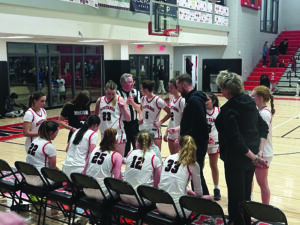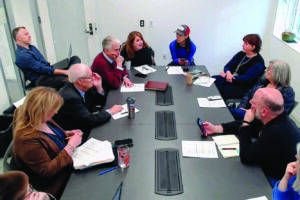
In what is sizing up to be one of the most consequential elections of our time, American voters will have their first comprehensive opportunity to weigh in with their reaction to the current presidential administration as every seat in the U.S. House of Representatives, a third in the U.S. Senate and much more will be up for a new vote on Nov. 6.
Democrats are expected to make major gains, with most predicting they will take control of the House and some thinking they could win control of the Senate, as well. Issues like the current Kavanaugh hearings and the president’s reaction to them will be among the still-unfolding decisive factors.
Women, especially, are angling to be an unprecedented, major factor in this election, both in terms of turnout but also in terms of running for office. Emerge America, a major initiative to identify, recruit and train women candidates has been ongoing, with the former Secretary of the Commonwealth (and George Mason High School history teacher) Kate Hanley, spearheading the effort in Virginia. Hanley made a presentation on the effort at the monthly meeting of the Falls Church City Democratic Committee last week.
She cited the “sea change” that has been going on in terms of women’s participation in elections this year, including as candidates.
But also key will be the on-the-ground efforts to get out the voters and to make sure that the votes count. The concern still looms of the unprecedented Russian interference in the U.S. election in the fall of 2016 that many believe was responsible for the election of Donald Trump.
Ahead of Election Day, it is the looming deadline for voter registration that is concerning activists knocking on doors and making phone calls. That comes a week from Monday, on Oct. 15, and campaign teams are focused on two things that might be underappreciated:
First, anyone who turns 18 by Election Day is eligible to vote, even if they’re not 18 when they register.
Second, voters are being encouraged to check the state’s database to make sure their registration is current and active.
According to Falls Church’s voter registrar David Bjerke, the process is as easy as googling the Virginia Department of Elections and following the prompts. He told the News-Press he urges voters to not only check their registration to make sure everything is in order, but to snap a photo of it.
He suggests that be done now, and again on the eve of the registration deadline, and a third time on the eve of the election, to make sure nothing has changed or potentially tampered with.
Bjerke said his office is also downloading the entire Falls Church registered voter list onto a secure memory stick away from the Internet, to make sure that no potential hacking occurs to alter the list.
It is an indicator of the seriousness with which election officials are taking the potential for online hacking to meddle with the upcoming election, at least in Virginia. The statewide data base in Illinois had been hacked in 2016.
Virginia got a major wake-up call on this score in the summer of 2017, just before the deadline to be ready for the November 2017 state delegate and senate election.
According to Elizabeth Howard, the cybersecurity and elections counsel for the Brennan Center for Justice, and a former Virginia assistant state election official, in the wake of the concern for Russian interference in the 2016 presidential election, at a national Def Con hackers conference in Las Vegas in July 2016, computer whiz kids demonstrated how easy it was to hack online election systems.
In the news reporting on these disturbing results, one newspaper inadvertently published the password for one of the systems used in Virginia, and this caused an immediate freakout. Election experts in the state relayed the news to relevant officials and told them immediate action was required to ensure the public’s confidence in the November 2017 election.
Howard oversaw the decertification of the paperless systems in Virginia.
“We only had a week to line up alternative voting machines,” Bjerke said, “and we did it.” But he said his office was preparing to transition to a more secure voting system with a paper trail by January 2018, anyway, so there was money already appropriated for it. “We’d seen the writing on the wall,” he said.
With the statewide switch to voting machines with paper trails, there was an unprecedented upheaval in the November 2017 election, with Democrats picking up 15 seats in the House of Delegates to pull within one of a majority.
At a League of Women Voters’ forum on election security held in Arlington Tuesday night, Howard, Jeremy Epstein and Audrey Malagon discussed the issues and while they said election security is getting better in Virginia, there remain 13 states where only “direct recording of elections” (DRE) online voting systems, and none with paper trails, are still the norm.
This means that elections in Texas, Pennsylvania, New Jersey, Delaware, Kentucky, Indiana, Tennessee, Kansas, Louisiana, Arkansas, South Carolina and Georgia remain vulnerable to online hacking, even two years after the dangers of such systems have been well documented.
The conundrum is that election officials are wont to publicize these conditions much because they don’t want to hurt voter confidence in the election and thereby suppress the turnout.













